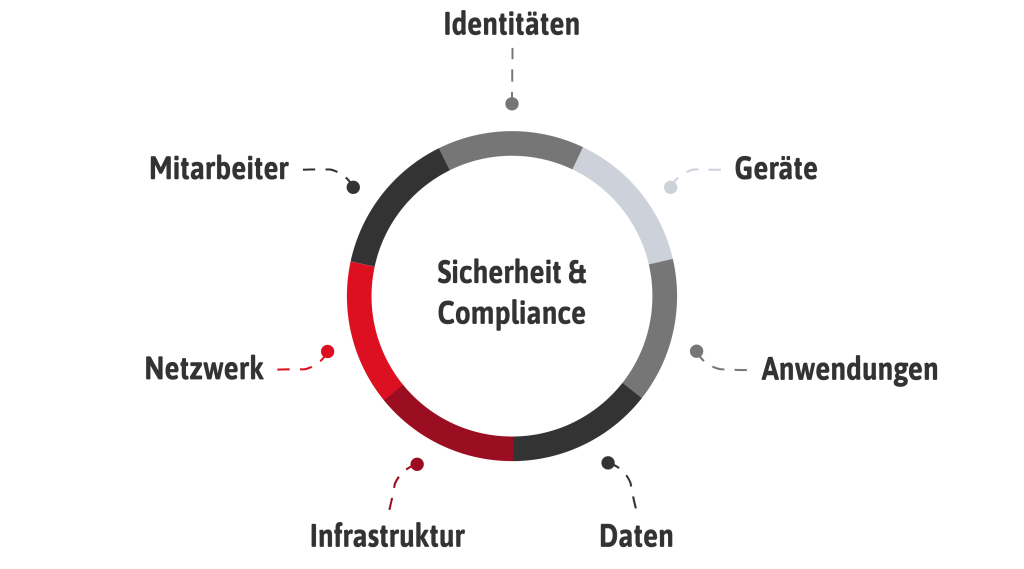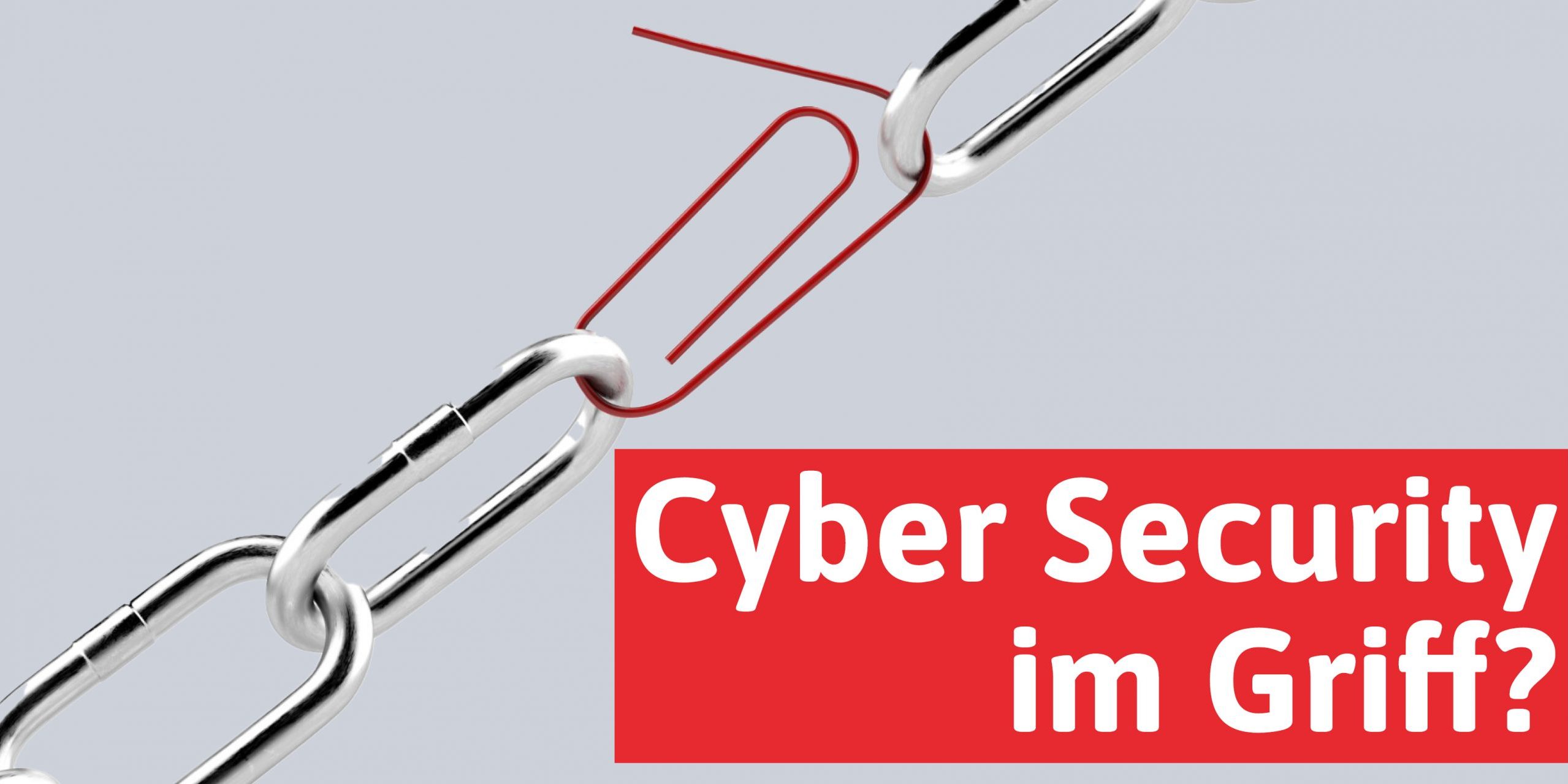Cybersecurity
According to a survey by Allianz Global Corporate and Specialty on “Business risks worldwide in 2022”, the risk of being affected by a cyber attack is back in first place. Last year it was relegated to second place due to disruptions in operational chains. The fact is, cyber security is not a topic to ignore.
Which cyber actors are there?
The actors have different profiles and pursue different goals. – They can be roughly divided as follows:
- Governments
- Companys
- Cyber criminals
- cyber terrorists
The range therefore extends from governments, which have considerable financial resources and capabilities to wage cyber war, to cyber criminals who have specialized in extorting ransoms using simple means using ransomware. The attacks target weak points in the IT security system. A successful attack on an entry point can compromise the IT security system.

Are smaller craft businesses also affected by hacker attacks? – Is cyber security even an issue?
Smaller craft businesses are not equally threatened by all actors. Cyber criminals are particularly interested in SMEs. The hurdles to penetrating a network are often lower than in large companies due to unclosed security gaps or a lack of security awareness among employees. The reasons are a lack of resources or a lack of know-how to ensure IT security.
How should managers react when cyber attacks block and paralyze the company?
It is important that managers address cyber security before an attack occurs. This makes it possible to prepare how to react correctly in an emergency. Processes and contact persons defined in advance ensure that you retain a certain amount of control over the situation, despite the state of emergency. It is important to remain calm, not to make hasty decisions and to first create a situation report.
The following questions can be helpful in preparing yourself against an attack:
- Is there a crisis team?
- Are the responsibilities and responsibilities in the crisis team clearly defined?
- Are the required resources and skills available in the crisis team?
- Is the process clearly defined and up to date?
- Are there regular exercises on how the crisis team should react in an emergency?
If a cyber attack occurs, specialists should be called in as quickly as possible and the police and the National Center for Cyber Security (NCSC) should be contacted. Companies that specialize in cyber incidents can help minimize the damage and, if possible, prevent it from spreading. The police can secure and analyze data traces for later criminal prosecution and also put you in contact with specialists. Reporting the incident to the NCSC helps to assess what type of malware has infected you and whether other companies are affected.
How do you protect yourself against a cyber attack?
The biggest risk factor in IT security is people. Expensive firewalls and software are powerless if employees are not aware and may circumvent technical security precautions through their behavior. Therefore, it should be a central concern of every SME to train employees in IT security.
A comprehensive IT-Security consists of the following building blocks:
- Antivirus
- Firewall
- Anti-Ransomware
- Patch management
- backups
- Proactive monitoring
- Raising employee awareness
As can be seen, these individual building blocks can be implemented using software and hardware solutions, training or manual controls. This is also the reason why modern IT security is complex and expensive.
Should you store your data externally and should this be done every day?
Many companies neglect the issue of data backup. In some cases it is carried out using outdated methods that are not 100 percent reliable. Please note that the data backup is checked and tested regularly to prevent data loss in the event of an emergency. Since cybercriminals are able to completely analyze a company's network topography, it is advisable to keep backups network-wise and geographically separate from the productive system. This can also prevent complete data loss from occurring in a natural disaster.
An Backup solution in the cloud with storage location in Switzerland can counteract this problem. The frequency of backup depends on the data generated, its reproducibility and the company's willingness to take risks. Even a daily backup is not always sufficient.
What specific measures can SMEs take to protect themselves against a cyber attack?
It is important for the company to understand that IT security is a recurring process and cannot be ensured through a one-time investment. As a first step, it is recommended to carry out a security assessment, as IT security is a basic requirement for the operation of modern IT systems. Any weak points in the company are discovered and remedied after consultation with experts. This is a snapshot that can change, for example, through the use of new software or devices. It is therefore crucial that IT vulnerability management is carried out. This is a continuous process through which entry points are continuously identified, examined, prioritized, contained and responded to by an IT security system. The implementation of such a vulnerability management system reduces the vulnerability of the IT security system.
In a further step, employees should use one Security awareness training be sensitized. Security awareness is a permanent learning process that is intended to promote awareness of IT security. That's why refresher courses and pointing out current dangers are extremely important.
“A chain is only as strong as its weakest link”. – A saying that enjoys general popularity in a variety of situations is also part of the answer to the question: “What is the biggest IT security challenge in your company?”
Conclusion cyber security
In summary, it is clear that companies, regardless of their size, can fall victim to a cyber attack. It is therefore important for all companies to prepare for this and establish appropriate processes.
Developing awareness about cyber security is crucial – because: “There are two types of companies: those that have already been hacked and those that will be hacked.”- Robert Mueller, Director of the FBI (2001 – 2013)
Contact us for a non-binding consultation Consultation and together we will establish the best strategy for your IT security.
Police
Local police station
or directly 117





